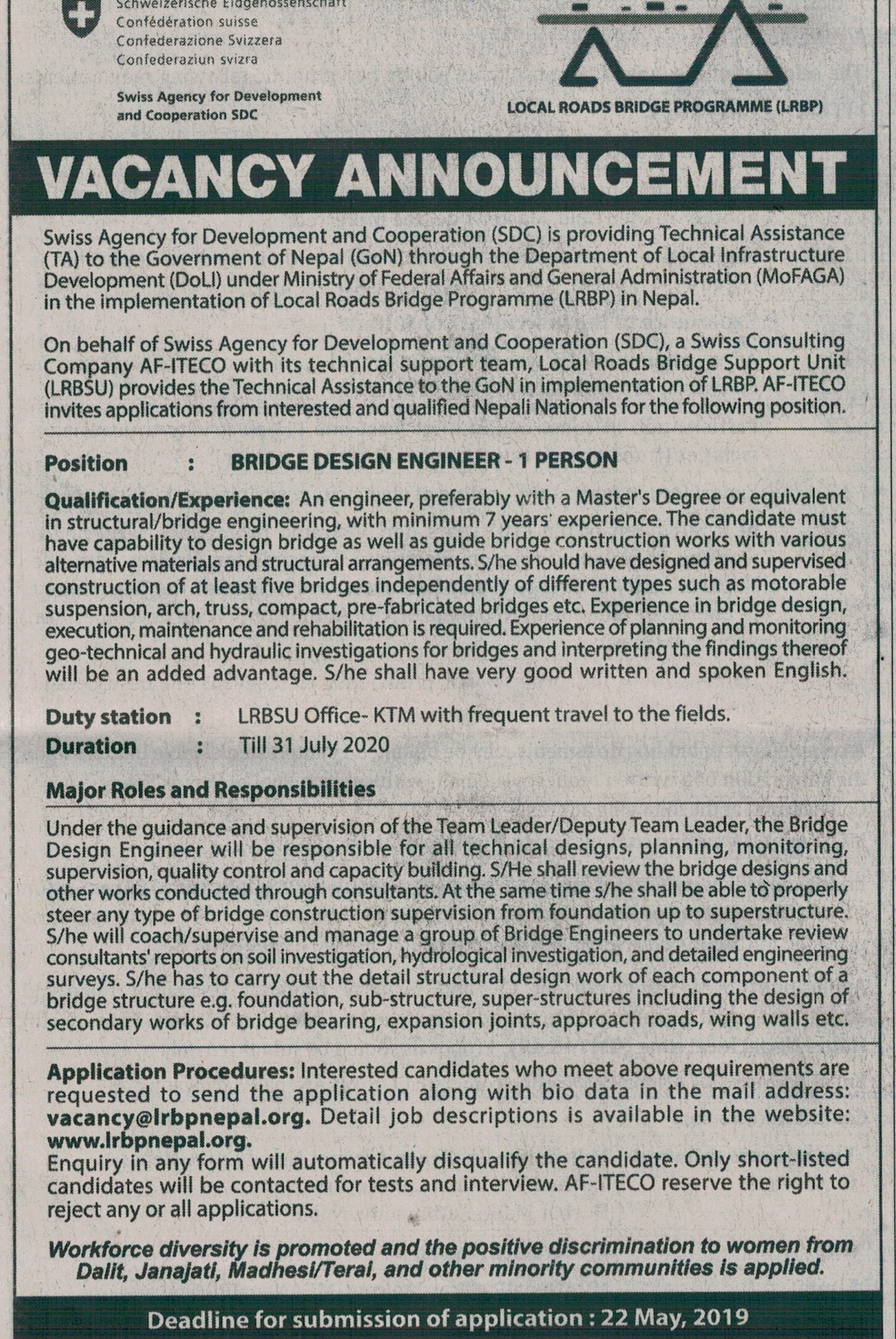Education and Experience:
An engineer, preferably with a Masters Degree or equivalent in structural/bridge engineering, with minimum 7 years’ experience. The candidate must have capability to design bridge as well as guide bridge construction with various alternative materials and structural arrangements. He should have designed independently at least five major bridges of different types such as motorable arch, truss, pre-stressed girders, compact, pre-fabricated bridges etc. Experience in designing and implementing bridge rehabilitation is required. Experience of planning & monitoring geo-technical and hydraulic investigations for the bridges and interpreting the findings thereof will be an added advantage. S/he shall have very good written and spoken English. Bridge construction experience is also must in addition to design.
Terms of Reference:
Under the guidance and supervision of the Team Leader/Deputy Team Leader, the Bridge Design Engineer will be responsible for all technical designs, planning, monitoring, supervision, quality control and capacity building. S/He shall review the bridge designs and other works conducted through consultants. At the same time s/he shall be able to properly steer any type of bridge construction supervision from foundation up to superstructure. S/he will coach/supervise and manage a group of Bridge Engineers to undertake review consultants’ reports on soil investigation, hydrological investigation, and detailed engineering surveys. S/he has to carry out the detail structural design work of each component of a bridge structure e.g. foundation, substructure, super-structures including the design of secondary works of bridge bearing, expansion joints, approach roads, wing walls etc. In detail, the Bridge Design Engineer with the help of the team of Bridge Engineers shall carry out following tasks:
Required social/behavioral competence are:

Lack of access is one of the principal reasons for high incidence of rural poverty in Nepal. There is a strong correlation between poverty and access to economic and social services. An estimated 30,000 kms of rural roads (over 50,000 Kms exist, of which more than 55 % are non-operable) are needed to provide the connectivity required. About 22% of the population still has to walk more than 4 hours in the hills and 2 hours in the plains to reach a strategic road network.
With the main goal of the programme to contribute to “improved livelihoods of the people and to local economic development in the four programme districts of Ramechhap, Sindhuli, Okhaldhunga, and Khotang, Local Roads Improvement Programme (LRIP) now takes proven approaches further by ensuring even more all-weather accessibility to markets and services by emphasising the importance of maintenance and preservation of built roads through promotion of labour-based roads maintenance methods and by fostering an institutional process in the On behalf of the GoN, the Ministry of Federal Affairs and Local Development (MoFALD) shall extend the necessary guidance and support to the programme and ensure collaboration of the participating districts. On behalf of MoFALD, the Department of Local Infrastructure Development and Agriculture Roads shall be responsible Department to coordinate the programme at national level. ITECO Engineering Ltd. CH, will represent the Programme Support Unit (PSU) on behalf of SDC shall provide technical assistance to GoN. LRIP-PSU shall support in capacity building of the partner districts in the management of district roads focusing on road maintenance, rehabilitation and construction together with social development activities. In fulfilling its objective, LRIP is entrusted to concentrate its efforts on maintenance of existing maintainable roads over new construction.